Fleurs du Mal Magazine


Or see the index
.jpg)
W i l l e m B i l d e r d i j k
(1756-1831)
By den dood van mijn Jongste Zoontjen
Il piano steffo li pianger non lascia.
(DANTE)
Thands niet verr’van u, mijn waarde; msst in uwen arm gekneld,
Zwelgt mijn hart te zilte tranen, van wier stroom mijn boezem welt.
Zwelgt het uw en mijne tranen : tranen, aan geen oog ontplascht,
Waar een ’t peil ontwassen droefheid in verademt, in ontlast!
Neen, maar tranen van den boezem die in de overstelping stikt,
En met onbevochtigde oogen naar den hollen doodstuip snikt!
Thands, van uwen arm omvangen…! Dierbare, ach, dezelfde smart,
De eigen pijl doorgrieft ons beiden, ja, doorreeg ons beider hart.
Siddrend, en den zinnen bijster, slaan wy ’t stijf en starrend oog
Op elkanders bleeke wangen — en wy zien die wangen droog!
ô Wat schouwspel, mijn Geliefde! wat gezicht vol aakligheên!
’t Wicht verstijft u in die armen! ik. in d’eigen arm, versteen!
Ach! wat riep ik uit, verdwaasde, by een vroeger harteslag
» Zalig, die zijn Vadertranen met een Egâ mengen mag! »
Thands vermag ik ’t, en geen afstand weigert ons die ijdle troost!
Vliet thands, tranen, kunt gy vlieten! vliet vereenigd op ons kroost!
Hemel! hemel, zoo weldadig! dit is dan uw dierbre gift!
Gift, zoo vurig afgebeden, en omhelsd met zoo veel drift!
Dit is ’t wichtjen, zoo bekoorlijk, daar ons diepgegriefd gemoed
Twee paar wreed verloren wichtjens zich zoo blijd in zag vergoed!
Dit, dit wichtjen, zoo aanvallig, in wiens hemelvollen lach,
’t Oudrenhart deze aard verdwijnen, en een Eden open zag!
In wiens zieldoorstralend lonkjen ’t lief en schuldloos zieltjen sprak,
Als ’t teedre rozenmondjen naar ons beider kusjens stak!
Wiens aanvallig zoet gekozel ons geheel het hart ontsloot,
Als zijn minlijk handendrukjen ons den blijden morgen bood!
Morgen, die ons hart vervulde met den zegen van ons lot!
Morgen, thands voor eeuwig duister — ! zonder hemel, zonder God!
Hemel!, hemel, zoo weldadig…! ach! ik weet dat gy het zijt;
Maar kan dit een Vader voelen, wien de vlijm het hart doorrijt!
’k Moest dan hieruit verre streken, uit een afgelegen Volk,
’k Moest dan hier door woeste baren, over stroom en waterkolk,
’k Moest dan hier het zand gaan zoeken dat uw lijkjen dekken mocht!
Hier uw asch een graf ontsluiten, was dan alles wat ik zocht!
’t Moest mijn Vaderland hervinden om te sterven io uw graf!
’t Was uw doodkist, dierbaar wichtjen, dat dit Vaderland my gaf!
’t Was uw doodkist — ! Groote hemel! ô Vergeef eens Vaders hart,
Wat het opwerp’, wat het smoore, in de wanhoop van zijn smart!
Leyden, ô onzalig Leijden, waar mijn boezem zoo naar trok!
Waar ik enkel zielrust hoopte, na zoo menig’ harteschok!
Waar mijn borst zich zou herhalen van haar eindeloos gezucht,
En mijn wallend bloed zich koelen in eene onberoerde lucht!
’t Is uw schoot dan, dierbaar Leyden, die mijn wichtjens asch verslindt!
Niets, niets zoch ik in uw wallen dan de doodbaar van mijn kind!
Hemel! hemel, zoo weldadig! Gy die heil en rampen zendt!
Moet my elke voetstap voeren tot vernieuwing van elland?
Moet ik land by land doorkruisen, zonder uitzicht, zonder troost,
Om heel de aarde te overspreiden met de lijkjens van mijn kroost!
Dierbaar wichtjen, thands het tiende, dat my ’s aardrijks schoot bewaart,
(Ach, hoe luttel, goede hemel, heeft uw deernis my gespaard!)
Dierbaar wichtjen, meer dan allen vastgeklonken aan mijn ziel!
Dierbaar wichtjen, waar my alles, alle vreugde, meê ontviel!
Dierbaar wichtjen, boven allen die het gruwzaam lot my nam,
My ten kenmerk van Gods zegen op de teêrste huwlijksvlam!
Ach, daar ligt gy, neêrgezegen, als een platgereden blom!
Daar, het vonkjen uitgetreden, waar uw hemels oog van glom!
Wek het bloemtjen, doe het rijzen, windtjen van den morgenstond!
Blaas het leven weêr in ’t vonkjen met den adem van uw’ mond!
Geef ons ’t leven in het leven met de lust des levens weêr!
Of, ô hemel, stort den vader by zijn zielloos wichtjen neêr!
ô Mijn boezem! kost gy schreien! Neen, gy kunt het niet, ô neen!
Krijt dan! krijt, en dring’ dit krijten door de verste stranden heen!
Krijt, en gil de holle wanden en hun doffen weêrgalm stom!
Krijt, en doe den klaagtoon zwijgen van het doodsche grafgebrom!
Zullen wand en doodklok treuren als van uwen rouw geroerd,
Gy versteenen, gy verharden, daar uw hart u wordt ontvoerd!
Wie kan wat gy uitstaat voelen? wie, gevoelen en weêrstaan!
Wie weêrstaan, en tot den hemel geen verwijten op doen gaan!
Wie het onbescheid niet vloeken, dat geweld doet aan Natuur
En het bloeden wil verbieden aan de diepe hartkwetsuur!
Krijt dan, ja! en help my krijten, ô mijn dierbare Echtgenoot!
Ach, dat stil, dat starziend zwijgen is my wreeder dan de dood.
Geef, Geliefde, geef een’ uittocht aan het hartverworgend leed!
Sla uw’ boezem, wring de handen, noem, ja, noem den hemel wreed!
Ja, verwensch ons-beider liefde, oorzaak van dat gruwzaam wee!
Vloek onze Echttoorts, vloek my-zelven die u liefde kennen deê!
Zoeter zal die vloek my wezen van uw diepgetroffen hart
Dan dit zwijgend nederzinken, in eene onoplosbre smart.
Lieve, druk u aan mijn’ boezem! in des harten Wel verstopt,
Snik naar adem, hijg naar lichtnis! voel hoe ’t siddrend bloed my klopt!
ô Herroepe ’t u aan ’t leven, dat gy hebt bemind om my!
ô Bemin het nog, mijn Waarde; ja, hoe wreed het leven zij!
ô Bemin het om het telgjen, ’t eenigst dat voor ons nog bloeit!
Voel de tranen op uw wangen, daar zijn oog u meê besproeit!
Voel de kusjens, die zijn mondtjen tusschen u en my verdeelt!
Voel ons-beider ziel vereenigd in ons beider evenbeeld!
Reik en hem en my de handen tot een blijk van teedre min!
En barst uit, mijn Zielsgeliefde; hoe uw doodsche smart niet in!
Gy bekoomt dan, lieve Gade! ach! ik voel uw hart weêr slaan.
Hijg, ô boezem, aan den mijnen! — Maar wat zie ik? ach, een’ traan!
Dank, ô hemel, voor dat traantjen! ô mijn lippen, kust het af!
Maar, ô neen, het eischt te vlieten op des lieven zuiglings graf.
Vliete ’t, ja, en onbedwongen! geve ’t aan uw smarten lucht!
Geve ’t doortocht aan den boezem voor een’ Moederlijken zucht!
Ach, daar welt hy, zoo weldadig! hy, die zucht die ’t hart ontlast;
En de stroom begint te groeien, die de wangen overplascht.
Schrei, mijn Weêrhelft, spaar geen tranen! ô die tranen zijn u zoet,
Wel hem, die ze mag vergieten als de rouw ze stijgen doet!
Smaak hun lichtnis, lieve Gade! Smaak haar, thands ons eenig kroost,
Dat, en met en om ons schreiend, ons uw tranen plengt ten troost!
Schreit, en wekt ook my die tranen, die my ’t schroevend leed misgunt!
Doe my schreien van genoegen, dat gy weder schreien kunt!
Ja, ik kan het, ik gevoel het! ja, mijn borst breekt snikkende uit.
Vloeit, mijne oogen! vloeit als stroomen, wee hem, die uw vlieten stuit!
Ja, betalen wy die schatting aan den noodeisch der Natuur!
Gy, heb dank voor deze tranen, immerweldoend Albestuur!
Immer weldoend! — Heilig Vader, gy die geeft en ook herneemt!
ô Vergeef het menschlijk harte, met uw raadsbesluiten vreemd!
ô Vergeef het, zoo ’t onzinnig, zoo ’t weêrspannig zich verzet!
Zoo ’t verwijt en wrevel ademt voor de klaagstem van ’t gebed!
Ach! het harte van een’ vader — God : gy kent, gy ziet het door!
Waar, waar is hy, die zijn kinders, en zijn reden niet verloor?
Immer weldoend! — wat is leven, zoo de dood een weldaad is?
Wat bezitten, zoo er weldaad is verbonden aan ’t gemis?
ô Mijn ziel, ô sluit uwe oogen! leer dit Godsgeheim ontzien!
Dood en leven zijn uw weldaad, Vader, laat uw wil geschiên!
Dierbaar, van mijn hart gereten, lief, en onvergeetbaar wicht!
’k Moet u ’s aardrijks schoot hergeven! wat ontzettelijke plicht!
Plicht, die ’t lijdend Vaderharte, dat naar zijne ontbinding smacht,
Van zijn tweetal lieve loten met zoo’n wellust had verwacht!
’k Moet, — en, uitgedreven balling, vreemd in eigen Vaderland,
Waar, waar berg ik u in de aarde, u, mijn hart, mijn ingewand!
Balling, ach! en zelfs geplonderd van mijn erflijk grafgesteent’,
Mag ik u geen rustplaats schenken by voorvaderlijk gebeent’.
Schokt niet, ouderlijke beenders, staat niet op om dezen smaad,
Zoo het stof van uwe kinders verre van uw stof vergaat!
Is uw grafkuil ons gesloten, ga, mijn teêrgeliefde kind,
Ga ter rust (ik zal u volgen) by uws vaders diersten vrind. —
Gy, die steeds voor mij een vader, een teêrhartig vader waart,
En wiens oogen nog te sluiten voor mijn weêrkomst was bespaard,
Gy, ô Halsvrind, wien mijn voeten wagglend leiden naar uw graf,
Zie, zie op! een deel uws hartvriends daalt reeds in uw armen af.
ô Ontfange ’t met uw beenders haast het nietig overschot,
Als my ’t uur der rust zal dagen, dat bestemd is van mijn’ God!
Lieve Heiland, die ons leven en ons sterven hebt beproefd!
Die den mensch hebt aangetogen, en eens Engels troost behoefd!
Gy, gy hebt de kleine wichtjens van uw kniën niet belet,
Gy, gy zegende in uw armen dezen zegen van het bed!
Gy, gy hebt hem aangenomen tot uw eigendom en kroost!
Mijn Alexis, ja, was de uwe! Lieve Jezus, dit geeft troost.
Teedre Weêrhelft, wees gelaten! leg uw handen in mijn hand!
Vlechten we onzer beider armen om ons thands nog eenig pand.
Hy, hy is onze eerste zegen, hem vroeg de Almacht niet weêrom!
Hy getuigt ons van Gods liefde. — Kom, mijn levens leven, kom ! —
Biên wy Jezus d’ons ontrukte, schreiend, ja, maar willig aan!
Hem als hemeling te groeten, ô verdient dat niet een’ traan?
Hem, na ’t doorgeworsteld leven, met geheel een Englen stoet,
Uit uw’ zuivren schoot geboren, voortgesproten uit mijn bloed,
Hem, hem alleen weêr te omhelzen in de volheid van Gods heil — !
Lieve Gade, deze wellust is voor niets dan tranen veil.
Dierbre Goël,.ja, wy voelen, wy erkennen die genâ;
Sla ons met ontfermende oogen, sla ons in dees droefheid gâ!
Gun, ô gun dit oovrig telgjen beider vurigen gebeên!
Gun ons, hem (genadig Heiland) in uw’ hemel voor te treên!
Voor te treden! Lieve Jezus! waar zijn heil, zijn erfdeel zij!
Meer dan dit voor hem te vragen laat ons ’t Ouderhart niet vrij.
Eer of schatten, aardsche wijsheid, waar het hart zich op verheft — !
Neen, zij needrigheid zijn luister, zy, die grootheid overtreft!
Gy, gy zult hen niet begeven, die uw bloed geëigend heeft.
Gy geeft nooddruft, gy verzading, wie op uw betrouwen leeft.
Alles heeft hy, dierbre Heiland, die uw liefde slechts bezit!
Schenk haar aan ons eenig knaapjen, en hy hebb’ nooit ander wit!
Geef ons uit zijn jonge lenden spruiten tot dien schoonen dag,
Die uwe Almacht op de wolken als Hersteller groeten mag!
En, behaagt het u, ô Vader, gy die neemt en ook hergeeft!
Troost ons weder met een telgjen, waar Alexis in herleeft!
1806
.jpg)
Willem Bilderdijk gedichten
k e m p i s p o e t r y m a g a z i n e
More in: Archive A-B, Bilderdijk, Willem
.jpg)
Gabriele D’Annunzio
(1863-1938)
Intra du’ Arni
Ecco l’isola di Progne
ove sorridi
ai gridi
della ronine trace
che per le molli crete
ripete
le antiche rampogne
al re fallace,
e senza pace,
appena aggiorna,
va e torna
vigile all’opra
nidace,
né si posa né si tace
se non si copra
d’ombra la riviera
e sera
circa l’isola leggiera
di canne e di crete,
che all’aulete
dà flauti,
alla migrante nidi
e, se sorridi, lauti
giacigli all’amor folle.
Ecco l’isola molle.
Ecco l’isola molle
intra du’ Arni,
cuna di carmi,
ove cantano l’Estate
le canne virenti
ai vènti
in varii modi,
non odi ?,
quasi di nodi
prive e di midolle,
quasi inspirate
da volubili bocche
e tocche
da dita sapienti,
quasi con arte elette
e giunte insieme a schiera,
su l’esempio divino,
con lino
attorto e con cera
sapida di miele,
a sette a sette,
quasi perfette
sampogne.
Ecco l’isola di Progne
Gabriele D’Annunzio poetry
fleursdumal.nl magazine
More in: Archive A-B, D'Annunzio, Gabriele
.jpg)
Charles Baudelaire
Op winterdagen na het stille eten
denk ik vaak met de borstel aan de vaat
van alle poëzie is hij de maat
dat zweer ik op de bloedzucht van mijn neten
hij leefde aan de oever langs de Lethe
waar vrouwen syf schonken in ruil voor zaad
als waren zij de bloemen van het kwaad
van zoete folter leek zijn geest bezeten.
Op winterdagen na een karig maal
zwoer hij de wereld af voor dure plichten
dan schreef hij verzen op een wand van staal
en kerfde zich een weg naar zijn gedichten
waarmee hij als fantoom, welhaast rectaal
de klok van onlust luidde in gestichten.
Kees Godefrooij
kempis poetry magazine
More in: Archive A-B, Archive A-B, Archive G-H, Baudelaire, Charles, Godefrooij, Kees
.jpg)
Delmira Agustini
(1886-1914)
El Poeta Leva el Ancla
El ancla de oro canta…la vela azul asciende
Como el ala de un sueño abierta al nuevo día.
Partamos, musa mía!
Ante lo prora alegre un bello mar se extiende.
En el oriente claro como un cristal, esplende
El fanal sonrosado de Aurora. Fantasía
Estrena un raro traje lleno de pedrería
para vagar brillante por las olas.
Ya tiende
La vela azul a Eolo su oriflama de raso…
El momento supremo!…Yo me estremezco; acaso
Sueño lo que me aguarda en los mundos no vistos!…
Acaso un fresco ramo de laureles fragantes,
El toison reluciente, el cetro de diamantes,
El naufragio o la eterna corona de los Cristos?…
Delmira Augustini poetry
fleursdumal.nl magazine
More in: Agustini, Delmira, Archive A-B

Elizabeth Akers Allen
(1832-1911)
Rock Me to Sleep
Backward, turn backward, O Time, in your flight,
Make me a child again just for tonight!
Mother, come back from the echoless shore,
Take me again to your heart as of yore;
Kiss from my forehead the furrows of care,
Smooth the few silver threads out of my hair;
Over my slumbers your loving watch keep;—
Rock me to sleep, mother, – rock me to sleep!
Backward, flow backward, O tide of the years!
I am so weary of toil and of tears,—
Toil without recompense, tears all in vain,—
Take them, and give me my childhood again!
I have grown weary of dust and decay,—
Weary of flinging my soul-wealth away;
Weary of sowing for others to reap;—
Rock me to sleep, mother – rock me to sleep!
Tired of the hollow, the base, the untrue,
Mother, O mother, my heart calls for you!
Many a summer the grass has grown green,
Blossomed and faded, our faces between:
Yet, with strong yearning and passionate pain,
Long I tonight for your presence again.
Come from the silence so long and so deep;—
Rock me to sleep, mother, – rock me to sleep!
Over my heart, in the days that are flown,
No love like mother-love ever has shone;
No other worship abides and endures,—
Faithful, unselfish, and patient like yours:
None like a mother can charm away pain
From the sick soul and the world-weary brain.
Slumber’s soft calms o’er my heavy lids creep;—
Rock me to sleep, mother, – rock me to sleep!
Come, let your brown hair, just lighted with gold,
Fall on your shoulders again as of old;
Let it drop over my forehead tonight,
Shading my faint eyes away from the light;
For with its sunny-edged shadows once more
Haply will throng the sweet visions of yore;
Lovingly, softly, its bright billows sweep;—
Rock me to sleep, mother, – rock me to sleep!
Mother, dear mother, the years have been long
Since I last listened your lullaby song:
Sing, then, and unto my soul it shall seem
Womanhood’s years have been only a dream.
Clasped to your heart in a loving embrace,
With your light lashes just sweeping my face,
Never hereafter to wake or to weep;—
Rock me to sleep, mother, – rock me to sleep!
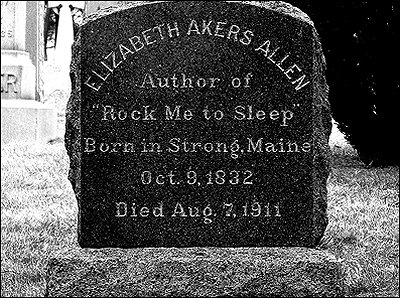
Elizabeth Akers Allen poetry
kempis poetry magazine
More in: Archive A-B
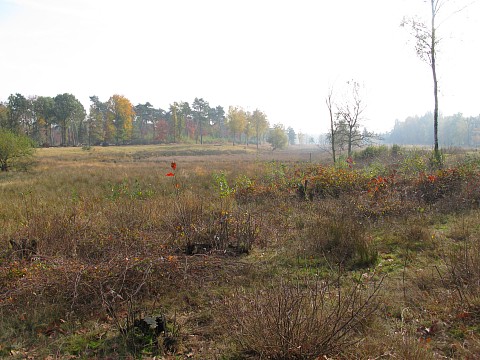
.jpg)
William Blake
(1757-1827)
To Autumn
O Autumn, laden with fruit, and stainèd
With the blood of the grape, pass not, but sit
Beneath my shady roof; there thou may’st rest,
And tune thy jolly voice to my fresh pipe,
And all the daughters of the year shall dance!
Sing now the lusty song of fruits and flowers.
`The narrow bud opens her beauties to
The sun, and love runs in her thrilling veins;
Blossoms hang round the brows of Morning, and
Flourish down the bright cheek of modest Eve,
Till clust’ring Summer breaks forth into singing,
And feather’d clouds strew flowers round her head.
`The spirits of the air live on the smells
Of fruit; and Joy, with pinions light, roves round
The gardens, or sits singing in the trees.’
Thus sang the jolly Autumn as he sat;
Then rose, girded himself, and o’er the bleak
Hills fled from our sight; but left his golden load.
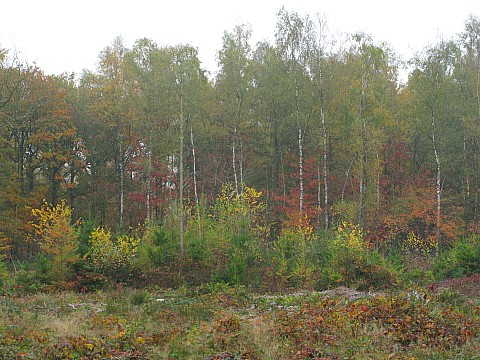
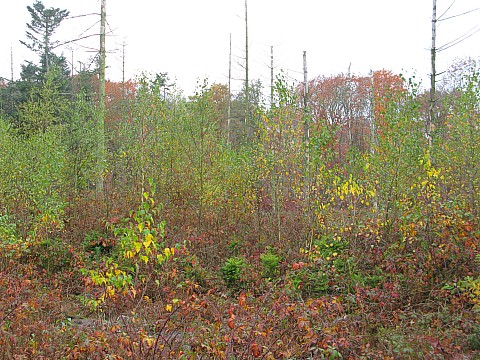
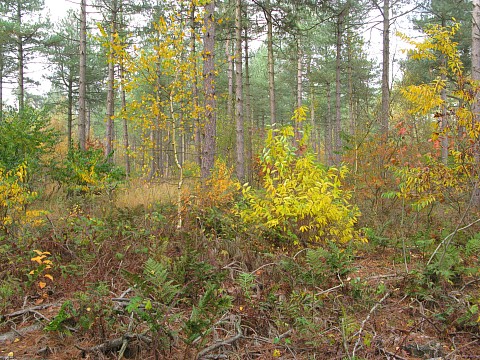
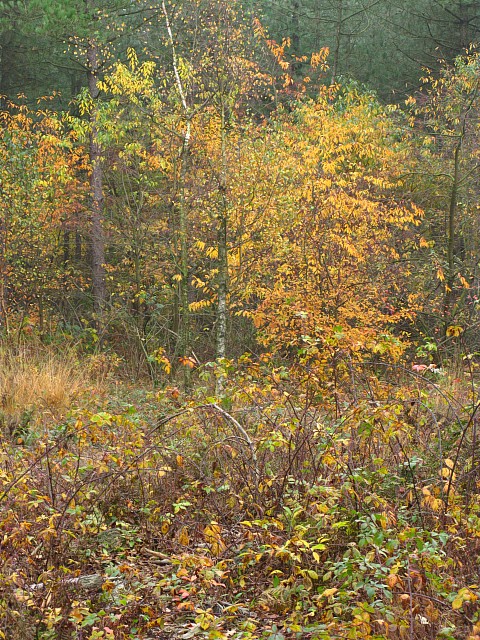

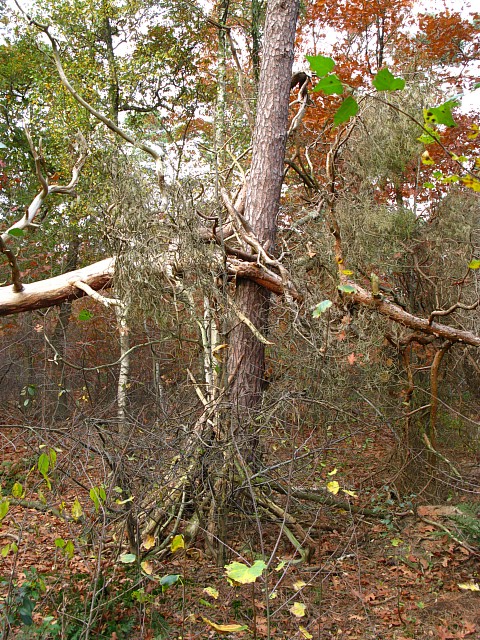
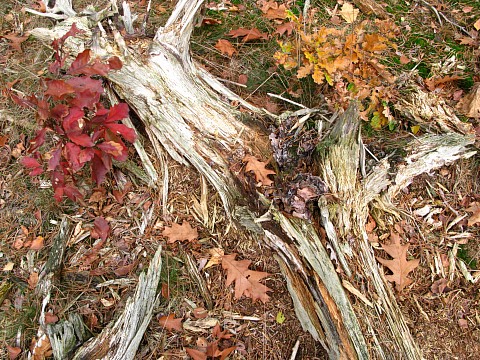
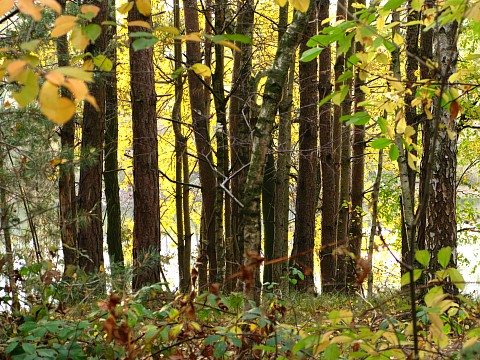
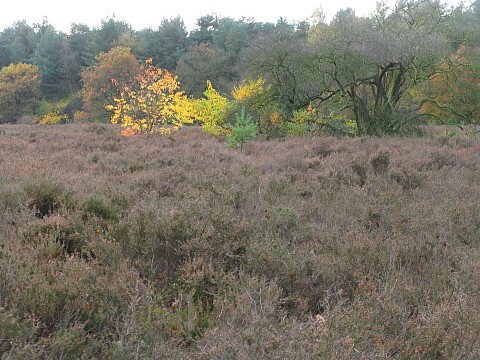

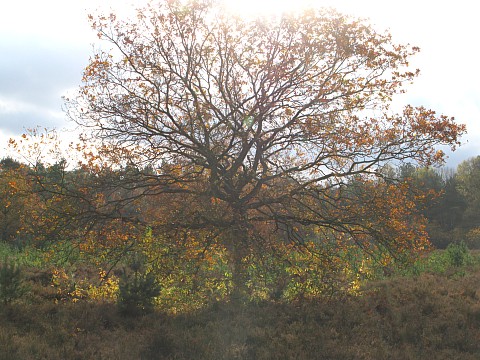
Ton van Kempen photos: Autumn 4
W. Blake poetry
fleursdumal.nl magazine
More in: 4SEASONS#Autumn, Archive A-B, Archive A-B, Blake, William, Ton van Kempen Photos
![]()
Louise Ackermann
(1813-1890)
L’amour et la mort
(A M. Louis de Ronchaud)
I
Regardez-les passer, ces couples éphémères !
Dans les bras l’un de l’autre enlacés un moment,
Tous, avant de mêler à jamais leurs poussières,
Font le même serment :
Toujours ! Un mot hardi que les cieux qui vieillissent
Avec étonnement entendent prononcer,
Et qu’osent répéter des lèvres qui pâlissent
Et qui vont se glacer.
Vous qui vivez si peu, pourquoi cette promesse
Qu’un élan d’espérance arrache à votre coeur,
Vain défi qu’au néant vous jetez, dans l’ivresse
D’un instant de bonheur ?
Amants, autour de vous une voix inflexible
Crie à tout ce qui naît : “Aime et meurs ici-bas ! ”
La mort est implacable et le ciel insensible ;
Vous n’échapperez pas.
Eh bien ! puisqu’il le faut, sans trouble et sans murmure,
Forts de ce même amour dont vous vous enivrez
Et perdus dans le sein de l’immense Nature,
Aimez donc, et mourez !
II
Non, non, tout n’est pas dit, vers la beauté fragile
Quand un charme invincible emporte le désir,
Sous le feu d’un baiser quand notre pauvre argile
A frémi de plaisir.
Notre serment sacré part d’une âme immortelle ;
C’est elle qui s’émeut quand frissonne le corps ;
Nous entendons sa voix et le bruit de son aile
Jusque dans nos transports.
Nous le répétons donc, ce mot qui fait d’envie
Pâlir au firmament les astres radieux,
Ce mot qui joint les coeurs et devient, dès la vie,
Leur lien pour les cieux.
Dans le ravissement d’une éternelle étreinte
Ils passent entraînés, ces couples amoureux,
Et ne s’arrêtent pas pour jeter avec crainte
Un regard autour d’eux.
Ils demeurent sereins quand tout s’écroule et tombe ;
Leur espoir est leur joie et leur appui divin ;
Ils ne trébuchent point lorsque contre une tombe
Leur pied heurte en chemin.
Toi-même, quand tes bois abritent leur délire,
Quand tu couvres de fleurs et d’ombre leurs sentiers,
Nature, toi leur mère, aurais-tu ce sourire
S’ils mouraient tout entiers ?
Sous le voile léger de la beauté mortelle
Trouver l’âme qu’on cherche et qui pour nous éclôt,
Le temps de l’entrevoir, de s’écrier : ” C’est Elle ! ”
Et la perdre aussitôt,
Et la perdre à jamais ! Cette seule pensée
Change en spectre à nos yeux l’image de l’amour.
Quoi ! ces voeux infinis, cette ardeur insensée
Pour un être d’un jour !
Et toi, serais-tu donc à ce point sans entrailles,
Grand Dieu qui dois d’en haut tout entendre et tout voir,
Que tant d’adieux navrants et tant de funérailles
Ne puissent t’émouvoir,
Qu’à cette tombe obscure où tu nous fais descendre
Tu dises : ” Garde-les, leurs cris sont superflus.
Amèrement en vain l’on pleure sur leur cendre ;
Tu ne les rendras plus ! ”
Mais non ! Dieu qu’on dit bon, tu permets qu’on espère ;
Unir pour séparer, ce n’est point ton dessein.
Tout ce qui s’est aimé, fût-ce un jour, sur la terre,
Va s’aimer dans ton sein.
III
Eternité de l’homme, illusion ! chimère !
Mensonge de l’amour et de l’orgueil humain !
Il n’a point eu d’hier, ce fantôme éphémère,
Il lui faut un demain !
Pour cet éclair de vie et pour cette étincelle
Qui brûle une minute en vos coeurs étonnés,
Vous oubliez soudain la fange maternelle
Et vos destins bornés.
Vous échapperiez donc, ô rêveurs téméraires
Seuls au Pouvoir fatal qui détruit en créant ?
Quittez un tel espoir ; tous les limons sont frères
En face du néant.
Vous dites à la Nuit qui passe dans ses voiles :
” J’aime, et j’espère voir expirer tes flambeaux. ”
La Nuit ne répond rien, mais demain ses étoiles
Luiront sur vos tombeaux.
Vous croyez que l’amour dont l’âpre feu vous presse
A réservé pour vous sa flamme et ses rayons ;
La fleur que vous brisez soupire avec ivresse :
“Nous aussi nous aimons !”
Heureux, vous aspirez la grande âme invisible
Qui remplit tout, les bois, les champs de ses ardeurs ;
La Nature sourit, mais elle est insensible :
Que lui font vos bonheurs ?
Elle n’a qu’un désir, la marâtre immortelle,
C’est d’enfanter toujours, sans fin, sans trêve, encor.
Mère avide, elle a pris l’éternité pour elle,
Et vous laisse la mort.
Toute sa prévoyance est pour ce qui va naître ;
Le reste est confondu dans un suprême oubli.
Vous, vous avez aimé, vous pouvez disparaître :
Son voeu s’est accompli.
Quand un souffle d’amour traverse vos poitrines,
Sur des flots de bonheur vous tenant suspendus,
Aux pieds de la Beauté lorsque des mains divines
Vous jettent éperdus ;
Quand, pressant sur ce coeur qui va bientôt s’éteindre
Un autre objet souffrant, forme vaine ici-bas,
Il vous semble, mortels, que vous allez étreindre
L’Infini dans vos bras ;
Ces délires sacrés, ces désirs sans mesure
Déchaînés dans vos flancs comme d’ardents essaims,
Ces transports, c’est déjà l’Humanité future
Qui s’agite en vos seins.
Elle se dissoudra, cette argile légère
Qu’ont émue un instant la joie et la douleur ;
Les vents vont disperser cette noble poussière
Qui fut jadis un coeur.
Mais d’autres coeurs naîtront qui renoueront la trame
De vos espoirs brisés, de vos amours éteints,
Perpétuant vos pleurs, vos rêves, votre flamme,
Dans les âges lointains.
Tous les êtres, formant une chaîne éternelle,
Se passent, en courant, le flambeau de l’amour.
Chacun rapidement prend la torche immortelle
Et la rend à son tour.
Aveuglés par l’éclat de sa lumière errante,
Vous jurez, dans la nuit où le sort vous plongea,
De la tenir toujours : à votre main mourante
Elle échappe déjà.
Du moins vous aurez vu luire un éclair sublime ;
Il aura sillonné votre vie un moment ;
En tombant vous pourrez emporter dans l’abîme
Votre éblouissement.
Et quand il régnerait au fond du ciel paisible
Un être sans pitié qui contemplât souffrir,
Si son oeil éternel considère, impassible,
Le naître et le mourir,
Sur le bord de la tombe, et sous ce regard même,
Qu’un mouvement d’amour soit encor votre adieu !
Oui, faites voir combien l’homme est grand lorsqu’il aime,
Et pardonnez à Dieu !
Louise Ackermann poetry
kempis poetry magazine
More in: Archive A-B
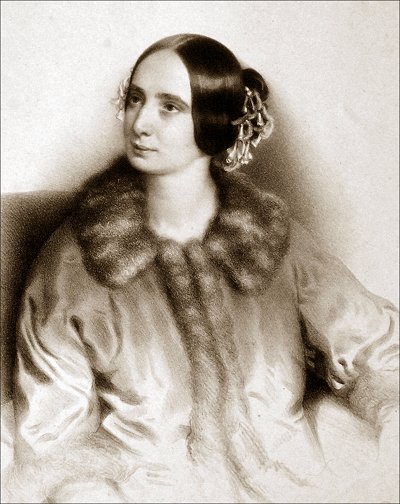
Betty Paoli
(Barbara Elisabeth Glück; auch: Branitz – 1814-1894)
Den Poesieverächtern
Ihr scheucht die Poesie
Von eu’rem Herde,
Und ahnet nicht, daß sie
Das Salz der Erde!
Daß Nebel nur und Rauch,
Was ihr beginnet,
Wenn’s nicht durch ihren Hauch
Bestand gewinnet!
Kein Traumbild, fremd und fern,
Entrückt dem Streben,
Sie ist der tiefste Kern
Von allem Leben!
Der Kern, deß Gluth und Licht
Es froh durchflammen!
Zermorschet er, dann bricht
Das Sein zusammen.
Betty Paoli poetry
kempis poetry magazine
.jpg)
More in: Archive A-B, Archive G-H, Archive O-P
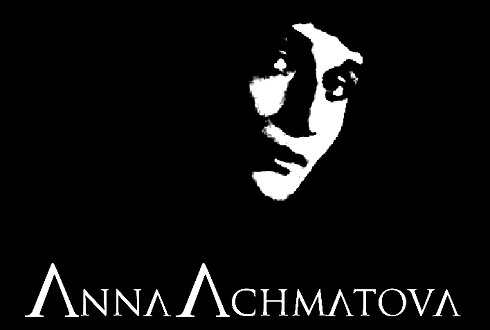
Anna Achmatova
(1889 – 1966)
Muza
Kogda ja noč’ju ždu ee prixoda,
Žizn’, kažetsja, visit na voloske.
Cto pocesti, cto junost’, cto svoboda
Pred miloj gost’ej s dudockoj v ruke.
I vot vošla. Otkinuv pokryvalo,
Vnimatel’no vzgljanula na menja.
Ej govorju: “Ty l’ Dantu diktovala
Stranicy Ada?” Otvecaet: “Ja”.
(1924)
Muse
When, at night, I waited for her, impatient,
Life seemed to me, as if hanging by a thread.
What just means liberty, or youth, or approbation,
When compared with the gentle piper’s tread?
And she came in, threw out the mantle’s edges,
She declined to me with a sincere heed.
I said to her, “Did you dictate the Pages
Of Hell to Dante?” She answered: “Yes, I did.”
(1924)
Anna Andrejevna Achmatova poetry
(Анна Андреевна Ахматова)
fleursdumal.nl magazine
More in: Achmatova, Anna, Archive A-B
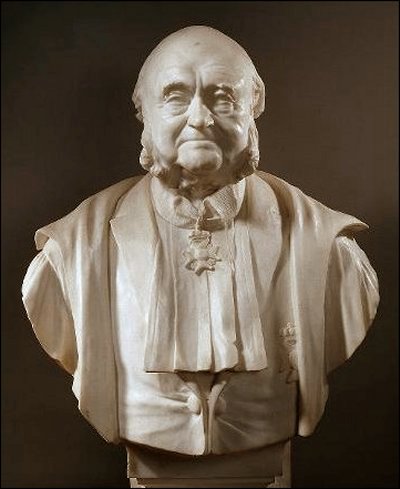
Nicolaas Beets
(1814-1903)
Aan Rachel
(Treurdichtspeelster )
Draagt gij den naam, zoo zacht, zoo schoon,
En zijt ge een dochter der geliefde,
Die Izaaks verbannen zoon
Vertroosten mocht van wat hem griefde;
Zijt gij geboren uit het bloed
Van haar, voor wie hij veertien jaren,
Die hem als zooveel dagen waren,
Eens anders schapen beeft gehoed;
Een kind dier lieve en lievenswaarde,
Die hem zijn lieven Jozef baarde,
Maar onder Benjamin bezweek;
Voor wie bij, in de kleine streek,
Die Efrata van Bethel scheidde,
Een rustplaats aan den weg bereidde;
Die nooit uit zijn gedachten week;
Zijt ge uit die koningsheup gesproten,
Die godlijke eere heeft genoten,
In ’t worstelperk aan Jabboks beek;
Vloeit u ’t gezegend bloed door de aderen
Van honderd uitverkoren vaderen;
Zijt ge uit het heilige geslacht
Der godsbeminden, godgewijden,
Dat, in de volheid van Gods tijden,
D’ Immanuel heeft voortgebracht;
Ligt al de plechtige ernst van ’t Oosten
Op ’t donker voorhoofd, dat ge ons toont,
En komt uw zonnig oog ons troosten,
Van al de flauwheid, die hier troont;
Verraden houding en gebaren
Een aangeboren vorstenrang,
En galmt ons, in uw stem, de zang
Van Sions maagdelijke scharen;
Is daar een weerschijn in uw geest
Van al de lichten, al de krachten,
Die in den tijd der voorgeslachten
De roem der Natie zijn geweest;
Verschijnt ons, tusschen uwe vlechten,
Een glans van grootheid en een gloed,
Om ’t pleit voor Isrel te beslechten,
Trots onbesneden overmoed;
Schijnt, onzen tijden tot een teeken,
De dochter Sions opgestaan,
En komt ze, ook in uw roem, zich wreken
Voor al den hoon haar aangedaan…
— En is er bij de breede scharen
Bestendiger bewonderaren,
Wier menigte om uw schreden woelt,
Geen enkel hart, dat dit gevoelt?
Ontroert gij niemand, onder allen,
De ziel als dochter Abrahams,
Als spruit des uitverkoren stams,
Nu van Jehova’s gunst vervallen?
Zoo ge elken avond nederziet
Op duizenden gedoopte hoofden,
Wier lippen den Messias loofden,
Dien uwe blindheid nog verstiet,
Zegt niemands bloedend hart zich: „Deze
Is hem een zuster naar den vleesche,
Maar Rachel kent dien Jozef niet!”
O Dochter Sems! als ge op uw lokken
Den haarband der vorstinnen drukt,
Om ’t hart van koningen te schokken,
Van ’t toovren uwer kunst verrukt;
Als ze optreedt om de rol te spelen
Der edelsten uit Japhets bloed,
Is daar geen stem in uw gemoed
Die andre rangen uit zou deelen?
Zijn daar geen driften in uw borst,
Die anders spreken, anders woelen
Dan westersch harte kan gevoelen?
En blaakt u niet een groote dorst,
En voelt ge u ’t kloppend hart niet persen,
En roept uw ziel niet overluid
Naar goddelijker dichtgeest uit,
Dan die u toegalmt in de verzen
Van Javans nagespeelde luit?
Verzucht gij niet naar ruimer snoeren
Dan van ’t Europisch maatgedicht,
Dat gij zoo kalm beheerscht, wellicht
Als niet geschikt uw ziel te ontroeren,
Als niet in staat u mee te voeren
Tot waar de kunst voor ’t leven zwicht?
O Telg der priestren en profeten,
Wie de ongewijde lauwer wast,
Heeft nooit uw hart u dien verweten,
Als voor uw schedel ongepast?
Ontwaakt er, als de kreten rijzen,
Waarin uw lof zoo luid weerklinkt,
In u geen zielszucht, die u dringt
Om al die glorie af te wijzen?
Is daar geen hoogheid In uw hart,
Waardoor u al die grootheid smart?
Geen hoogheid, die den smaad kan kiezen,
Waaronder ’t kroost van Abram bukt,
Maar niets van d’ adel wil verliezen,
Door God hem in de ziel gedrukt?
Ja, in vernedering en lijden
Den volken wezen tot een spel,
Dat is uw lot. o Israël!
Daarin vervullen zich uw tijden;
Dat is het erf-lot van uw schuld,
Waarin een groote ziel kan deelen
En waardiglijk haar plaats vervult;
Maar op hun heidensche tooneelen,
De rol der heidenen te spelen…
Geen dochter Rachels, die het duldt!
En zoo zij ’t duldt — in Rama’s velden
Ruischt daar een klacht op d’ avondwind,
Om Rachels boezemsmart te melden,
Beweenend haar verloren kind.
Gij hoort het niet. Gij hoort het galmen
Eens lofs, dien u een wereld brengt.
Als zij uw lauwren strooit en palmen,
Met parelsnoeren ondermengd.
Maar somtijds, in uw eenzaamheden,
Als gij, vermoeid van kunst en eer,
Uzelve zijn moogt, voor een keer,
Denkt gij terug aan ’t bang verleden,
En ziet uw haavloos hutje weer,
Waar gij, verloren en vergeten
In ’t luid getier der groote stad,
Die brood noch deernis voor u had,
Uw jeugd in kommer hebt gesleten.
Nog heugt u ’t lijden van uw hart,
Als ’t zich bewust werd van zijn krachten,
En aanving met een vreemde smart
Naar ’t onbekende goed te smachten
Dat nooit uw oogen duidlijk werd.
Nog heugt u, hoe u ’t denkbeeld krenkte,
Dus arm te zijn en onbekend,
Maar hoe een goede geest u wenkte
Daar kwam een eind aan deze ellend;
Uw brandend hart zou ademhalen,
Zou zijn verlangens zien geboet;
U zou een heldre zon bestralen,
En rozen blozen voor uw voet.
Maar hoe zich uw verbeelding pijnde,
Dat zij het woord des raadsels ried,
Zij vond het in haar droomen niet;
Dies uwe jeugd weemoedig kwijnde,
Omtastende in een blind verschiet
Waarover zich een nevel wolkte,
Die echter alles hopen liet — —
Ha, hoe het sedert zich bevolkte
En in wat glans gij ’t heden ziet!
Thans moogt gij in uw armen vatten,
Wat vóór u zweefde ver en dof.
Egypten offert u zijn schatten,
En Babels palmbosch ruischt uw lof.
Der kunsten nectar komt u laven,
En uw versmachting is geweest;
De zelfbewustheid van uw gaven
Verheft uw schedel onbedeesd.
Gesloten deuren vallen open;
Daar ligt de wereld van uw hopen
En gij beveelt haar door uw geest.
Maar ook die wereld heeft haar nachten.
Maar ook dat leven kent een dood;
Daar blijft een onverklaarbaar wachten,
Een onvervulde zielenood.
Nog komen zij, die oogenblikken,
Waarin de sterkste geest bezwijkt,
Wie heeft dan teugen die verkwikken
Wie, wat naar lafenis gelijkt?
Geen ziel kan ooit zichzelf bezielen
Wanneer zij wegzinkt zonder moed!
Geen wereld, die een ziel voldoet!
Schoon al heur goden voor haar knielen
Nog grijpt zij naar een meerder goed;
Nog kan haar, bij de gouden vruchten,
Haar mild geworpen in den schoot,
Wel hongren naar een voedend brood;
Nog overvallen haar de zuchten
Naar stille wateren van rust,
Te midden van haar schoonsten lust;
En welk genot haar mag bekoren
In ’t vrij gebied, dat haar behoort,
Niet altlid blijft de wensch gesmoord,
Om zelve een Meerdren toetehooren,
Een Meerdren, die die vrijheid stoort!
Een Meerdren! Ja, maar meer dan allen
En alles wat zij om zich ziet;
Met zulk een wil zij staan of vallen,
Maar met haar eigen wereld niet.
O Rachel! Toen uw zwarte lokken
U slordig hingen voor ’t gezicht,
Toen heeft zich, naakt en mager wicht,
’t Meelijdend hart u aangetrokken,
En uit den nacht gebracht in ’t licht.
De goeden, de eedlen, en de grooten
Wedijverden voor u in gunst,
En door de koningen der kunst
Werd u de weg des roems ontsloten;
Elk hunner gaf u — wat hij had;
Elk hunner wees u — wat hij kende;
Ondankbaar zoo gij ’t ooit vergat!…
Maar hadde u in die groote stad,
Als ge in de dagen dier ellende
Uw bedelbrood met tranen at,
Eens Christens mond het brood geprezen,
Dat uit den hemel is gedaald,
Uw ziele bij haar God bepaald,
Hij hadde u beter dienst bewezen,
Waarbij geen andre goedheid haalt;
En, mooglijk, ware u ’t licht gerezen,
Dat om het kruis van Christus straalt!
Het strale u nog! Het overschijne
Den lichtglans, waar uw hoofd van blinkt;
Totdat gij aan zijn voeten zinkt,
Voortaan geen andre, dan de zijne!
Totdat gij roept met luider keel:
„Mijn Heer, mijn God, mijn rots, mijn deel!”
Totdat gij nederwerpt de kronen
Der Phedra’s en der Hermionen,
En elke rol en iedren schijn
Vergeet, om zondares te zijn;
Totdat uw hand de Grieksche tressen,
Naar Joodsche wijze, op ’t hoofd ontsnoert,
En grijpt naar de alabaster flesschen,
Door dankbre liefdedrift vervoerd;
Tot gij de smaadheid uwes Heeren
Zult boven iedren krans begeeren,
En dragen Hem het kruishout na,
Die ’t droeg voor u, op Golgotha;
Totdat gij verre zult verkiezen
Al Faro’s gunsten te verliezen,
Mishandeld met het volk van God,
Voor ijdelheid en zingenot;
Totdat ge een wereld zult beklagen,
Die roemt in de evangelieleer,
Maar mooglijk luide rouw zal dragen,
Als ze u moet afstaan aan uw Heer.
Nicolaas Beets gedicht
kempis poetry magazine
More in: Archive A-B
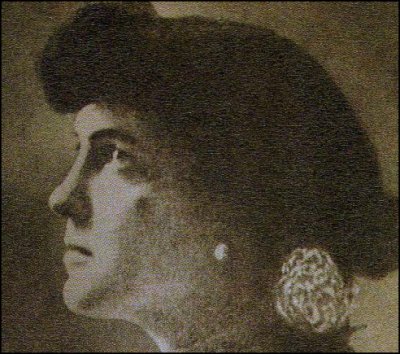
Delmira Agustini
(1886-1914)
El Poeta Y La Ilusion
La princesita hipsipilo, la vibrátil filigrana,
—Princesita ojos turquesas esculpida en porcelana—
Llamó una noche a mi puerta con sus manitas de lis.
Vibró el cristal de su voz como una flauta galana.
—Yo sé que tu vida es gris.
Yo tengo el alma de rosa, frescuras de flor temprana,
Vengo de un bello país
A ser tu musa y tu hermana!—
Un abrazo de alabastro…luego en el clavel sonoro
De su boca, miel suavísima; nube de perfume y oro
La pomposa cabellera me inundó como un diluvio.
O miel, frescuras, perfumes!…Súbito el sueño, la sombra
Que embriaga..Y, cuando despierto, el sol que alumbra en mi alfombra
Un falso rubí muy rojo y un falso rizo muy rubio!
Delmira Augustini poetry
fleursdumal.nl magazine
More in: Agustini, Delmira, Archive A-B, Delmira Agustini
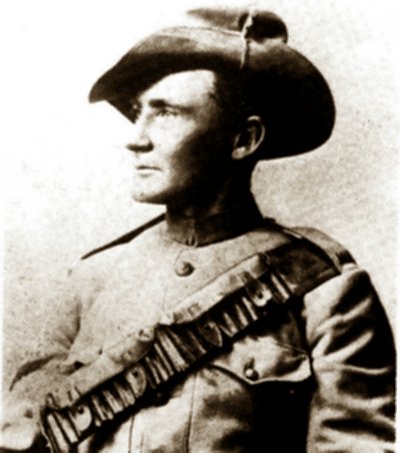
Harry ‘Breaker’ Morant
(1865-1902)
When The Light Is As Darkness
The morning-tide is fair and bright,
With golden sun up-springing;
The cedars glowed in the new-born light,
And the bell-bird’s note was ringing;
While diamonds dropped by dusky Night,
Were yet to the gidyas clinging.
The morning waned-the sun rose high
O’erhead, until ’twas seeming
But a dazzling disc, and the fiery sky
Like an opal sea was gleaming;
And languorous flowers – of morn gone by,
And coming eve – fell dreaming.
And now the moon above does creep
To laugh at red Sol sinking;
While wakening from their sunlit sleep,
A few wan stars are blinking,
And thirsty, drooping flowers deep
Of evening dews are drinking.
The birds will soon their carols cease,
And crows are homeward hieing;
The gloaming deepens, stars increase,
The weary day is dying –
Its requiem, murmurous of peace,
The vesper winds are, sighing.
This night is near! Are you waiting friend,
That Night? – we’re drawing nigh it –
When we to the Restful Land shall wend,
And leave life’s feverish riot –
When the gods to each tired soul shall send
Eternal, dreamless quiet.
Harry ‘Breaker’ Morant poetry
kempis poetry magazine
.jpg)
More in: Archive A-B, Archive M-N
Thank you for reading Fleurs du Mal - magazine for art & literature